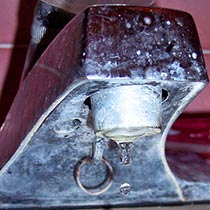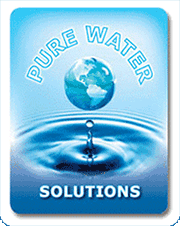
Stains on your sinks and bath, skin dry and itchy, gray laundry and cloudy glassware — these are signs you might have a problem with hard water.
The remedy? A water softener.
Do You Need a Water Softener?
- You notice scale buildup on your appliances.
If you have scale, you likely have hard water. Mineral deposits can form on tea kettles and coffee pots — and they can also build up within the pipes. This clogs plumbing so much that your house is actually less effective at passing water through the pipes. The consequence of hard water is scale buildup and defective plumbing.Scale, or “limescale,” is a hard, chalky substance made up of calcium and magnesium bicarbonate. These salts are what form the white chalky quality of the buildups. Water softeners can help to reduce this buildup of scale by using ion exchange technology.
- Your skin and hair is dry.
Minerals left on skin by hard water can cause dryness, flakiness, and breakouts. Hard water leaves a film on your hair and scalp too, making it dry, dull, and tangly.What happens is soaps and shampoos don’t dissolve well in hard water which makes it hard to rinse them off. Minerals in water combined with the of soap residue are left on your skin making it feel irritated, dry and rough. The residue also blocks pores and can causes inflammation and black heads. If it can clog the pipes, imagine what it can do to your pores! Hard water can also cause build up on your scalp, causing a dandruff-like condition to form.
- Your clothes are gray and faded.
Faded and grayish laundry is a sign of hard water. Clothes may feel scratchy and be hard to wash because there is so much extra mineral substance contained in your water.One thing you can do to reduce the grayness that comes from hard water is to get a front loader washing machine and use liquid detergent.
You can also get Calgon liquid water softening detergent or add vinegar to the fabric softening compartment. Try getting so sodium tripolyphosphate and adding it to your wash as well.
In the end, the best way to get rid of this gray mineral quality in your laundry is to get our State of the Art advanced but affordable quality Water Softener.
- You see stains on the sinks and bathtubs.
Hard water contains minerals, namely calcium and magnesium, that can react with soap. The stains areleft behind when the water evaporates, leaving behind plaster-like deposits in the bathtub and on the faucets. If you live in an area that also has iron in the water, you might see reddish brown stains.Cleaning these hard water stains can be a never-ending task but there are ways to remove them.
Use a little bit of vinegar and wipe around the base. You can also let the jets on your tub run for about 15 minutes and let soak for an hour or so. Pouring in a cup of bleach and a half cup powdered dishwasher detergent will also remove these mineral deposits.
However, an affordable quality water softener will be most effective at permanently removing stains and keeping them gone for good. You can pick up a water testing kit to determine how much mineral excess is in your water supply.
- Your plumbing is in constant need of repair.
Steel pipes are the worst for hard water. They are easily damaged from buildup of limescale. Your water just won’t flow as well.Copper and PVC pipes do better with hard water.
As the flow in your pipes becomes more restricted, the water pressure is lowered, abd limescale buildup happens at a faster rate.
If limescale starts building up around the valves in your washing machine and dishwasher, the valves can’t close completely, which leads to water leakage, reducing the lifespan of your home appliances.
Repairing your plumbing on a regular basis is expensive and causes extra wear on the house, so it’s better to find a way to prevent it.
- Your water bill is skyrocketing.
Your water usage will go up as your pipes have to work harder to let flow through.
If you notice your bill has recently gone up, you might need to get a softener.Check with your local utility company to find out if your water falls on the soft or hard end of the water hardness scale. They can do a sample analysis to determine how hard it is and can tell you what chemicals are added to the water to keep it at a softer level. If they say it’s at a higher level of hardness, they’ll likely recommend you install a water softener to lower your bill.
- Your glassware is cloudy, brittle or easily damaged.
Getting rid of hard water stains on glassware is a serious pain. Mineral buildup can also make glassware more prone to breaking easily.Try running your glasses through the dishwasher with a solution of 1/2 cup vinegar and no soap added. Try a few different cycles using just vinegar — more or less depending on how clean they are getting. This trick can work for silverware as well.
The key is to avoid powdered soap in the dishwasher because powdered reagents are more abrasive and won’t dissolve completely most of the time. You can also soak your glasses in the sink for a while with water and vinegar to get rid of stains. Of course, using a water softener to eliminate hard water stains is likely the most effective course of action.
How do water softeners work?
Basically, water softeners take out extra calcium and magnesium ions using an exchange with sodium or potassium ions. Once this exchange takes place, the water softener will regenerate and flush the system of excess ions until it has recharged them with new sodium ions. This may use about 25 gallons of water per day, so it’s important to determine your water hardness first.
If you think you have a hard water problem, please contact Pure Water Solutions for a FREE Water Analysis and no obligation consultation. Our affordable, environmentally safe, high tech filtration systems are Money Back Guaranteed, last 25 – 30 years, have a 10 Year warranty and are virtually maintenance free without paying for a lifetime of ongoing annual service calls.
Contact Pure Water Solutions
541-890-2751
for FREE on site water testing
As Southern Oregon’s most trusted, bonded, licensed, insured and highest reviewed company for water filtration and treatment, we are proud to provide service to the following Southern Oregon communities:
Medford, Grants Pass, Ashland, Klamath Falls, Rogue River, Gold Hill, Shady Cove, Trail, Central Point, Eagle Point, White City, Phoenix, Talent, Jacksonville, Applegate, Williams, Murphy, Selma, Cave Junction, and Brookings.
